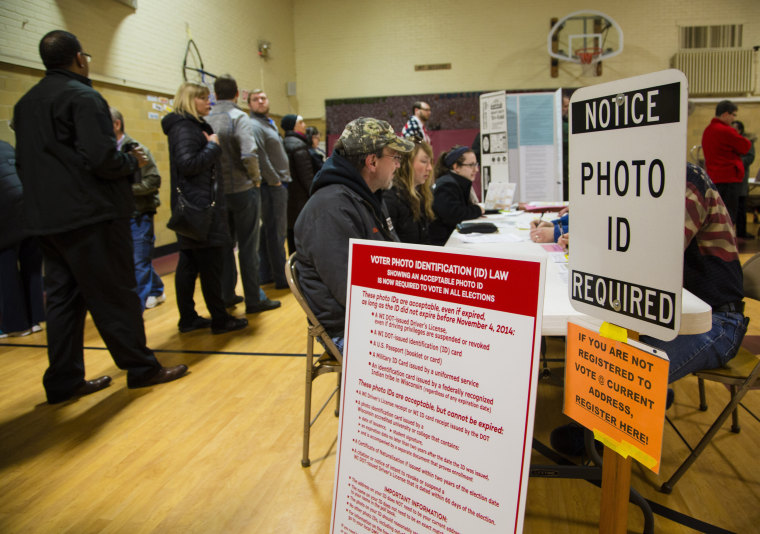A federal appeals court on Friday offered what some described as a compromise over Wisconsin’s strict voter ID law. But a closer look suggests the new rules will still keep eligible voters from the polls, maintaining a barrier to voting in a crucial presidential swing state this fall. To voting rights advocates, the arrangement underscores more starkly than ever how voter ID laws are designed not to ensure the integrity of the election, as their backers claim, but to make voting harder for certain groups.
The U.S. Court of Appeals for the 7th Circuit last week overturned a lower court’s ruling that had required Wisconsin to let people without acceptable ID cast a ballot if they signed an affidavit attesting to their identity. The appeals court said the affidavit option wasn’t necessary, because Wisconsin recently promised to make it very easy to get an ID at the DMV.
Related: Feds Urge Supreme Court to Leave N.C. Voter ID Ruling Intact
Specifically, in a set of emergency rules issued in May amid litigation over the ID law, the state said it would mail a free temporary ID to anyone who comes to a DMV office to request one, showing whatever documentation they have. (Previously, many voters were required to show a birth certificate or other underlying documentation to get a voter ID). As long as the state keeps to that pledge and publicizes the new rule, there’s no need to soften the law, the appeals court unanimously concluded.
But that raises a troubling issue: The state’s long-standing rationale for the ID law, passed by Republicans in 2011, has been the need to stop in-person voter-impersonation fraud (set aside, for now, that it can’t point to a single case of such fraud). “All it takes is one person whose vote is canceled by someone not voting legally and that’s a problem,” Gov. Scott Walker, the law’s most crucial backer, said recently in defense of the ID measure. “I always tell folks who oppose [the ID law], tell me whose vote they want canceled out.”
If anyone can now get a voter ID without showing proof of their identity, how does the law stop fraud?
Related: Virginia Restores Right to Vote to Thousands of Ex-Felons
Tom Evenson, a spokesman for Walker, said everyone who requests an ID at the DMV must pose for a photograph. "Therefore, anyone trying to commit fraud will have given us his or her photo and documents," Evenson added.
But to Sean Young, a senior staff attorney for the ACLU’s Voting Rights Project, which is leading the challenge against the law, the state's new openness to giving ID to all comers is revealing after for years it insisted that giving it to those who don't prove their identity would allow for fraud.
"For them to now claim any voter can get a photo ID at the DMV raises the question: Is the state really going after phantom voter fraud, or is it just trying to put unnecessary hoops in front of vulnerable voters?"
Related: Voting Fight Shifts to Local Level In North Carolina
Some opponents of the law are blunter.
“The willingness of Scott Walker to compromise in this way shows that this was never about fraud,” said Scot Ross of One Wisconsin Now, which brought one of the challenges to the law. “This was about denying people the right to vote.”
Indeed, the law still unquestionably adds a hurdle to the voting process. Walking into a DMV office and requesting an ID may not sound like a lot to ask of a would-be voter, and for many it’s not. But the law’s opponents say requiring a trip to the DMV will nonetheless end up keeping some people from the polls, especially in more marginalized communities. An estimated 300,000 registered Wisconsin voters lack an acceptable form of ID under the law, a court found.
One reason is access. According to a 2014 brief filed by opponents of the law, just three of Wisconsin’s 92 DMV offices are open after 5pm, and just two are open on weekends, making it difficult for many working people to get there. Over half operate just two days per week. One, in rural Sauk City, is open just three days a year.
Ahead of Wisconsin’s April primary, MSNBC spoke to one Madison high school senior who needed to make an hour-and-a-half round trip by bus to get an ID at the nearest DMV. He succeeded only after getting help from an organizer with a group that works to get voter IDs to those who need them.
Then there’s the issue of public education. After years of being told you need an ID to vote and you need other documents to get an ID, would-be voters must now hear and understand the news that it's no longer the case. The court is requiring Wisconsin to publicize the new rules, but given the Walker administration’s past failure to provide money for a public education campaign on the law, voting rights advocates are skeptical that the state will run an effective campaign.
Related: Trump Poll-Watching Plan Stirs Voter Intimidation Fears
Finally, the law's opponents say they don’t trust DMV clerks to consistently carry out the state’s pledge to give IDs to all comers.
“We have evidence that DMV employees, whether due to poor training or otherwise, do not consistently implement the procedures even on the books,” said Young of the ACLU. “You can’t make the DMV the ultimate gatekeeper to our democracy.”
